
Horticulture is the art and science of growing plants. This definition is seen in its etymology, which is derived from the Latin words hortus, which means "garden" and cultura which means "to cultivate". It is important to note that there are various divisions of horticulture because plants are grown for a variety of reasons. These divisions include, but are not limited to: gardening, plant production/propagation, arboriculture, landscaping, floriculture and turf maintenance. For each of these, there are various job-positions, aspects, tools used and associated challenges. Each require highly specialized skills and knowledge of the horticulturist.

Lalbagh Botanical Garden or simply Lalbagh, is an botanical garden in Bangalore, India, with an over 200-year history. First planned and laid out during the dalavaiship of Hyder Ali, the garden was later managed under numerous British Superintendents before Indian Independence. It was responsible for the introduction and propagation of numerous ornamental plants as well as those of economic value. It also served a social function as a park and recreational space, with a central glass house dating from 1890 which was used for flower shows. In modern times, it hosts two flower shows coinciding with the week of Republic Day and Independence Day. As an urban green space along with Cubbon Park, it is also home to numerous wild species of birds and other wildlife. The garden also has a lake adjoining a large rock on which a watchtower had been constructed during the reign of Kempegowda II.
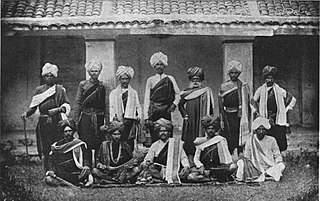
Vokkaliga is a community of closely related castes, from the Indian states of Karnataka and Tamil Nadu.
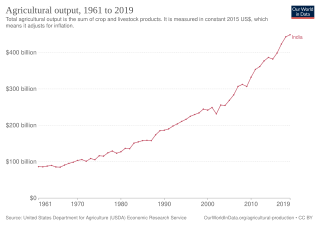
The history of agriculture in India dates back to the Neolithic period. India ranks second worldwide in farm outputs. As per the Indian economic survey 2020 -21, agriculture employed more than 50% of the Indian workforce and contributed 20.2% to the country's GDP.
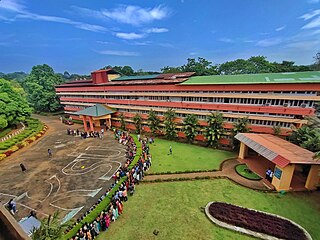
The College of Agriculture Vellanikkara, is the main campus and the premier college of Kerala Agricultural University, situated in Thrissur of Kerala state in India. The College of Agriculture imparts agricultural education at undergraduate, graduate and doctoral levels. The college has 22 departments, 11 All India Coordinated Research Projects and 11 centres undertaking the multiple activities of teaching, research and extension. The college is located in the picturesque of Kerala Agricultural University where the college and its departments itself spans the central campus in Vellanikkara, Thrissur. The college received Sardar Patel Outstanding Institution Award more than 10 times consecutively which is awarded by the Indian Council of Agricultural Research, for the institution's efficiency in contributing most number of Top ranks in JRF and SRF All India Entrance Examinations. The IPR cell under this college plays a pivotal role in establishing and promoting the Intellectual rights for products and services of the state and has secured the recognition of being the India's leading government institute for bagging most Geographical Indication tags. Agri Business Incubator functioning under the college is one of the prosperous and promising avenue for rising entrepreneurs of the state. The college was the first college to be awarded 'The Best College Award' by Kerala Agricultural University. College of Agriculture Vellanikkara is the only college under the university to win the intercollegiate Golden Lady Arts Trophy consecutively for about a decade. Dr. Mani Chellappan. Professor and Head, Department of Agricultural Entomology, CoA Vellanikkara, is the current Dean of the college

Shantaveri Gopala Gowda was a socialist politician who was thrice elected to Karnataka Vidhanasabha, the Legislative Assembly of Karnataka, in 1952, 1962 and 1967.
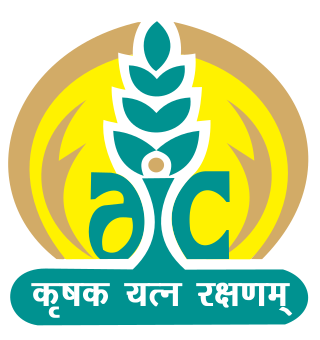
Agriculture Insurance Company of India Limited (AIC) is an Indian public sector undertaking headquartered in New Delhi. It is a government-owned agricultural insurer under ownership of the Ministry of Finance, Government of India. The company offers yield-based and weather-based crop insurance programs in almost 500 districts of India, and covers almost 20 million farmers, making it the biggest crop insurer in the world by number of farmers served.
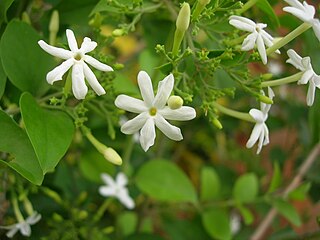
Jasmine is considered the queen of flowers and is called the "Belle of India" or the "Queen of fragrance" as it is exquisitely scented to soothe and refresh. In different parts of India it is called by different names—Mogra, Motia, Chameli, Malli puvvu, Jaati, Mulla, Mallige, Juhi, Mogra or Moonlight in the grove. It is reported that there are 300 varieties of jasmine. It is also stated that jasmine crossed the seas—from Asia to Europe, landing first along the Mediterranean Sea, conquering Greece and Turkey, reaching Western Europe through Spain, then France and Italy and finally landing in England in the latter part of the 17th century..

Coffee production in India is dominated in the hill tracts of South Indian states, with Karnataka accounting for 71%, followed by Kerala with 21% and Tamil Nadu. Indian coffee is said to be the finest coffee grown in the shade rather than direct sunlight anywhere in the world. There are about 250,000 coffee growers in the country; 98% of them are small growers. As of 2009, Indian coffee made up just 4.5% of the global production, being the 7th largest producer of coffee. Almost 80% of Indian coffee is exported; 70% is bound for Germany, Russia, Spain, Belgium, Slovenia, United States, United Kingdom, Japan, Greece, Netherlands and France. Italy accounts for 29% of the exports. Most of the export is shipped through the Suez Canal.
Pimpri Gawali is a village in Parner taluka in Ahmednagar district of the state of Maharashtra, India.
The cooperative movement in India plays a crucial role in the agricultural sector, banking and housing. The history of cooperatives in India is more than a hundred years old. Cooperatives developed very rapidly after Indian independence. According to an estimate, more than half a million cooperative societies are active in the country. Many cooperative societies, particularly in rural areas, increase political participation and are used as a stepping stone by aspiring politicians.
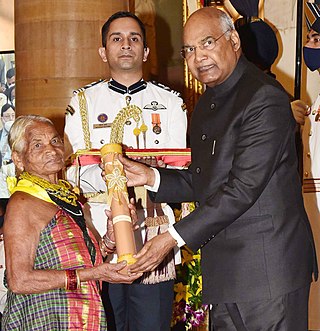
Tulsi Gowda is an Indian environmentalist from Honnali village, Ankola taluk in Karnataka state. She has planted more than 30,000 saplings and looks after the nurseries of the Forest Department. Her work has been honoured by the Government of India and other organisations. In 2021, the Government of India awarded her the Padma Shri, the country's fourth highest civilian award. She is known as the "Encyclopedia of the Forest" for her ability to recognise the mother tree of any species of tree.
Ajanale is a village in the state of Maharashtra, India. Administratively it is under the Sangole Taluka of Solapur District in Maharashtra. The village is known for its export quality anar (pomegranates). 90% of its population is directly or indirectly dependent on pomegranate production. Hence annual income is very high. The village is located 15 km by road west of the town of Sangole, and 8 km by road east of the village of Bombewadi and the bridge over the Man River.

The Indian Institute of Horticultural Research (IIHR) is an autonomous organization acting as a nodal agency for basic, strategic, anticipatory and applied research on various aspects of horticulture such as fruits, vegetable, ornamental, medicinal and aromatic plants and mushrooms in India. The institute has its headquarters in Bengaluru, Karnataka, India and is a subsidiary of Indian Council of Agricultural Research (ICAR), New Delhi, under the Ministry of Agriculture, India. It recently has been ranked 1st for the combined years 2019-20 and 2020-21 by the ICAR.
Krishna Lal Chadha is an Indian horticultural scientist, author and a former National Professor of the Indian Council of Agricultural Research. He was honored by the Government of India, in 2012, with the fourth highest Indian civilian award of Padma Shri.

Horticultural Producers' Cooperative Marketing and Processing Society, popularly known by its acronym, HOPCOMS, is a farmers' society founded in 1965 for the direct marketing of farm produces. The society is headquartered in Lalbagh, Bengaluru, in the south Indian state of Karnataka and its activities are spread in the districts of Bangalore Urban, Bangalore Rural, Kolar, Ramanagar, Mandya, Mysuru and Chikkaballapura.
Abdul Rauf Abdulkarim Shaikh is a progressive farmer, residing near Banavasi, Karnataka, India who is known for innovative cultivation of pineapple and he is conferred with honorary doctorate by University of Agricultural Sciences, Dharwad, for his achievement in horticulture.
Manmohan Attavar was an Indian horticulturist, plant breeder, writer and the founder of Indo American Hybrid Seeds (IAHS), an organization engaged in scientific plant breeding and horticulture. He founded the enterprise in 1965 and the organization, headquartered in Bengaluru, has grown to include 9 regional centres across India. He has served as a member of the Scientific Advisory Committee of the Ministry of Commerce and the Federation of International Seedsmen, Switzerland and has been a director of the National Horticultural Board. He has co-authored a book, Floriculture : technology, trades, and trends, which was published by Oxford and IBH Publishing House in 1994.

The Pradhan Mantri fasal bima yojana (PMFBY) launched on 18 February 2016 by Prime Minister Narendra Modi is an insurance service for farmers for their yields. It was formulated in line with One Nation–One Scheme theme by replacing earlier two schemes National Agricultural Insurance Scheme (NAIS) and Modified National Agricultural Insurance Scheme (MNAIS) by incorporating their best features and removing their inherent drawbacks (shortcomings). It aims to reduce the premium burden on farmers and ensure early settlement of crop assurance claim for the full insured sum.

The Department of Horticulture, Government of Punjab is the apex body for horticultural development in the state of Punjab, India. It works for increasing the land under horticultural crops, providing quality planting material, providing technical know-how to the farmers, reducing post harvest losses, etc.













